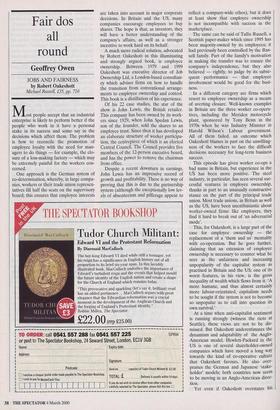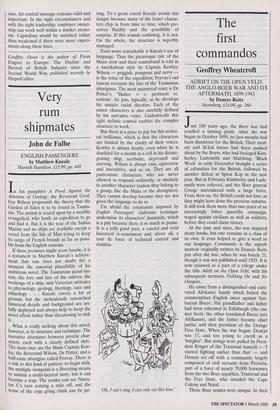Fair dos all round
Geoffrey Owen
JOBS AND FAIRNESS by Robert Oakeshott Michael Russell, £35, pp. 710 Most people accept that an industrial enterprise is likely to perform better if the people who work in it have a personal stake in its success and some say in the decisions which affect them. The problem is how to reconcile the promotion of employee loyalty with the need for man- agers to do things — for example, the clo- sure of a loss-making factory — which may be extremely painful for the workers con- cerned.
One approach is the German system of co-determination, whereby, in large compa- nies, workers or their trade union represen- tatives fill half the seats on the supervisory board; this ensures that employee interests are taken into account in major corporate decisions. In Britain and the US, many companies encourage employees to buy shares. The hope is that, as investors, they will have a better understanding of the company's affairs, as well as a stronger incentive to work hard on its behalf.
A much more radical solution, advocated by Robert Oakeshott in this illuminating and strongly argued book, is employee ownership. Between 1979 and 1999 Oakeshott was executive director of Job Ownership Ltd, a London-based consultan- cy which advises firms on how to handle the transition from conventional arrange- ments to employee ownership and control. This book is a distillation of his experience.
Of his 22 case studies, the star of the show is John Lewis, the British retailer. This company has been owned by its work- ers since 1929, when John Spedan Lewis, son of the founder, sold the shares to an employee trust. Since then it has developed an elaborate structure of worker participa- tion, the centrepiece of which is an elected Central Council. The Council provides five members of the 12-person executive board, and has the power to remove the chairman from office.
Despite a recent downturn in earnings, John Lewis has an impressive record of growth and profitability. There is no way of proving that this is due to the partnership system (although the exceptionally low lev- els of absenteeism and pilferage appear to reflect a company-wide ethos), but it does at least show that employee ownership is not incompatible with success in the marketplace.
The same can be said of Tullis Russell, a Scottish paper-maker which since 1995 has been majority-owned by its employees; it had previously been controlled by the Rus- sell family. Part of the family's motivation in making the transfer was to ensure the company's independence, but they also believed — rightly, to judge by its subse- quent performance — that employee involvement would be good for the busi- ness.
In a different category are firms which resort to employee ownership as a means of averting closure. Well-known examples in Britain are the three worker co-opera- tives, including the Meriden motorcycle plant, sponsored by Tony Benn in the 1970s when he was Industry Minister in Harold Wilson's Labour government. All of them failed, an outcome which Oakeshott blames in part on the unwilling- ness of the workers to face the difficult decisions necessary for long-term business success.
This episode has given worker co-ops a bad name in Britain, but experience in the US has been more positive. The steel industry, in particular, has seen several suc- cessful ventures in employee ownership, thanks in part to an unusually constructive stance on the part of the principal trade union. Most trade unions, in Britain as well as the US, have been unenthusiastic about worker-owned firms: like employers, they find it hard to break out of 'an adversarial mode'.
This, for Oakeshott, is a large part of the case for employee ownership — the replacement of a 'them and us' mentality with co-operation. But he goes further, claiming that an extension of employee ownership is necessary to counter what he sees as the unfairness and increasing unpopularity of the capitalist system as practised in Britain and the US; one of its worst features, in his view, is the gross inequality of wealth which flows from it. 'A more humane, and thus almost certainly more labour-orientated, capitalism needs to be sought if the system is not to become so unpopular as to call into question its own survival.'
At a time when anti-capitalist sentiment is running strongly (witness the riots at Seattle), these views are not to be dis- missed. But Oakeshott underestimates the dynamism and adaptability of the Anglo- American model. Hewlett-Packard in the US is one of several shareholder-owned companies which have moved a long way towards the kind of co-operative culture that Oakeshott favours. He also over- praises the German and Japanese 'stake- holder' models; both countries now seem to be moving in an Anglo-American direc- tion.
Yet even if Oakeshott overstates his case, his central message remains valid and Important. In the right circumstances and with the right leadership, employee owner- ship can work well within a market econo- my. Capitalism would be enriched rather than weakened if there were more experi- ments along these lines.
Geoffrey Owen is the author of From Empire to Europe: The Decline and Revival of British Industry since the Second World War, published recently by HarperCollins.



































































 Previous page
Previous page